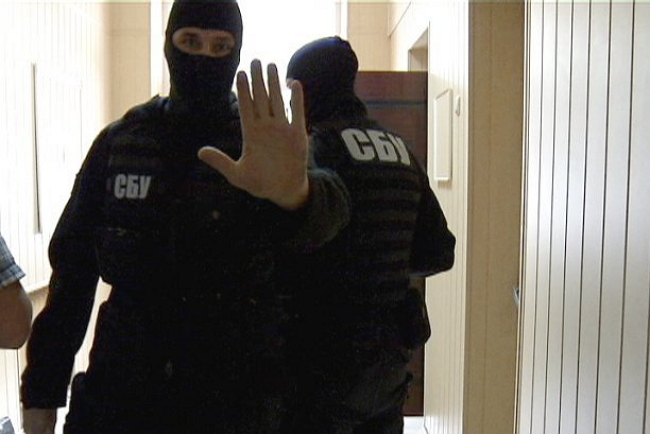Human rights activists accuse the government of attacks on civil society. The Human Rights Agenda platform, an informal coalition of human rights organizations, released its statement on 17 October, after a two major incidents happened in mid-October. The statement was supported by 33 organizations. The attacks mentioned in the statement concern:
1. Healthcare NGOs

On October 11, the investigators of Ukraine’s National Police Prosecutor General’s Office raided the office of the Charitable Fund "Patients of Ukraine" and seized the fund’s documents, accusing its leadership of the Charitable Fund "Patients of Ukraine," the All-Ukrainian Network of People Living with HIV/AIDS, and the Alliance for Public Health of alleged misappropriation of the assets of the Global Fund to Fight AIDS, Tuberculosis and Malaria and financing the so-called “Luhansk People’s Republic” and “Donetsk People’s Republic,” the two Kremlin-run proxy statelets in eastern Ukraine.
It should be noted that the Global Fund regularly conducts an international audit to check the targeted use of the provided funds and there have been no complaints about the audit results. The Charitable Fund "Patients of Ukraine," the All-Ukrainian Network of People Living with HIV/AIDS, and the Alliance for Public Health (formerly known as the International HIV/AIDS Alliance in Ukraine) are famous for their years-long work which prevents the emergence and existence of corruption schemes in the healthcare sector.
The Administration of the International Renaissance Foundation (IRF) also released its statement regarding the incident. The IRF has supported 10 projects of the All-Ukrainian Network of People Living with HIV/AIDS (since 2002) and 15 projects of the Patients of Ukraine Charitable Foundation (since 2011). According to the statement, all IRF-funded projects were implemented by these organizations at a high professional level and in accordance with the IRF's requirements for ensuring transparency, accountability, and proper financial control.
“In the light of the cases of increased pressure against civil society organizations, whose activity publicly reveals corruption, we also have the reason to speak of the threat of the authorities’ systematic resistance to constructive civic activism. This attitude halts democratic reforms that are impossible without the civic participation, and this must be stopped,” says the statement.
2. Left-wing activists

On October 12, the officers of the Security Service of Ukraine (SBU) conducted raids and detained several activists of the Lviv-based NGO "Autonomous Resistance" on suspicion of plotting "protest actions ordered by the Kremlin propagandists." In violation of the law, they were not given the chance to use free legal aid. Later, the activists were told that they had the status of witnesses and they were released. Despite the severe public accusations, the Security Service has not provided any facts to confirm the alleged criminal activity aimed at overthrowing the constitutional order. The activists themselves associate this incident with their struggle against the unlawful real estate development in the city of Lviv.
The Human Rights Agenda platform noted that the stamp “Kremlin's agent” is overused by the public officials nowadays, saying that:
"the use of the 'Kremlin agent' stamp is becoming an increasingly popular means of cracking down on people or organizations that disclose illegal actions of government officials or do not support certain decisions of public authorities or officials. Such policy patterns follow the authoritarian practices of the Russian Federation and inevitably lead to the fact that any criticism of the incumbent authorities will be regarded as an attempt of political destabilization in the country."
The NGO "Autonomous Resistance" works in Lviv since 2009 and is considered a left-wing subcultural youth group with elements of anarchism and Ukrainian nationalism. Now it has about 40 members. According to its member Anna Ivantsik, nowadays organization is dealing with political, ecological and social issues, fighting against illegal developers, and stands for the interests of the Lviv community. In Lviv, they are in a state of constant conflict with extreme right groups.
This is how human rights activists Kostyantyn Reutskyi described Maksym Osadchuk and Denis Matsola, members of the Crimean Euromaidan and who were among detained by SBU, and the organization:
“They were in the same group of activists as Oleksandr Kolchenko, Oleg Sentsov, Hennadiy Afanasiyev [Russia's political prisoners, Afanasiev was released - Ed]. Maksym Osadchuk gave a new birth for the organization, making it leftist-nationalist. For the Ukrainian field, this is a unique combination of smart nationalist positions of the right and left platforms under national flags with slogans for social justice.”
The last protests of the Autonomous Resistance" took place near the Embassy of Belarus in support of political prisoners of the country. Then, the police detained some activists – they were looking for grenades and weapons and suspected them in preparing a terrorist attack. “They found only a megaphone and banner,” says Ivantsik.
“The Human Rights Agenda platform considers that such actions manifest the pressure exerted on civil society which began with a targeted campaign to discredit the anti-corruption activists and the registration in the Parliament of presidential bills that unreasonably require that the non-governmental organizations file additional financial reports, apart from already existing ones,” says the statement regarding the two incidents.
The background of the government attacks on activists

The tectonic fault in the relationship between activists and the government first happened in spring of 2017, when a law obliging anti-corruption NGOs to submit e-declarations identical to those of state officials was passed in Parliament.
The pressure of the international community and civil society made the government reconsider its decision. However, the well-known tactic of creating working groups to delay making a final decision been applied here as in many other cases, meaning that this obligation has still not been taken away from anti-corruption NGOs.
Further government attack on activists had taken various forms. A number of them involved the NGO Anti-Corruption Center (ANTAC):
- A smear campaign in Parliament, where a defamatory film claimed to be a “documentary” was shown. The activists believe this was aimed at depriving the organization of its non-profit status.
- A criminal investigation opened by the Prosecutor General’s Office against the NGO for alleged embezzlement of US Embassy funds, which was closed after the embassy issued an official statement.
- A fake protest near the house of ANTAC leader Vitaliy Shabunin on 9 April 2017. The anti-corruption activist himself stated that the protest was organized by the Security Services of Ukraine (SBU) and the deputy head of it Pavlo Demchyna in particular.The SBU refuted any involvement in organizing the fake protest. However soon journalists of Radio Svoboda published detailed proof that indeed the SBU supervised the protests from the very beginning.
Also, this year the SBU was accused of persecuting business structures. On 26 April 2017, it came to Dragon Capital, one of the biggest Investment companies in Ukraine, with searches. The official reason was the illegal use of some software. In result, 3 computers with “spy software produced in the Russian Federation,” as stated by the SBU, were confiscated by the Security Services employees. In fact, the software was just some program which controls the working time of the Dragon Capital’s employees.
However, Tomas Fiala, Chief Executive Officer of Dragon Capital, is confident that the searches were an attempt to pressure him in a business case where interests of an MP from the Petro Poroshenko's Bloc were involved.
Read also: Ukraine’s Security Services at a crossroads: to cover the authorities or to protect the people





